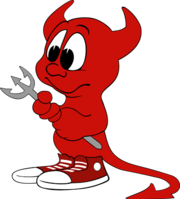-
Posts
22,656 -
Joined
-
Last visited
-
Days Won
673
Content Type
Profiles
Forums
Events
Everything posted by BronxWench
-
Ah, February, when the weather pattern resembles a roller-coaster, and my brain wants to hibernate...
- Show previous comments 10 more
-

More like the middle I guess, on the east coast, about 2 hours north of Sydney.
-
So, more or less along the Tropic of Capricorn?
-

South of there. The Tropic of Capricorn passes through the state of Queensland and I’m in NSW (New South Wales).
-
And it looks like the new hard drive is doing the trick, for which I am profoundly grateful!
Just in time for the first round of edits for the republications….

- Show previous comments 4 more
-

I’d probably not be writing if it weren’t for the computer. The ability to backspace, change, revise. I’ve done some hand stuff since then, usually when I’m too far away from the computer; it’s a bit better in quality, but I wouldn’t be able keep up with it.
-
.thumb.jpg.558cb100bfb29cdf7ad2f9dd1281d2ea.jpg)
And here, I started writing with pen and paper... Then to a typewriter... Then DOS... Now MS Word... i really have a problem... lol. On a serious note, that's always good to hear, BW

-
- BronxWench and Wilde_Guess
-
 2
2
- Report
-

I might still have a few of my very early, handwritten scribbles somewhere. Possibly.

-
Okay, the new hard drive is being treated to a clean install of Windows 10, and then I get to reinstall EVERYTHING else so I can move my files over properly.
- Show previous comments 3 more
-
A fast and durable hard drive is never a bad thing. As for *nix, you will want to be VERY COMFORTABLE with the “normally hidden wires” of an operating system before using it. I have experience with SCO Unix, Intel Solaris, Linux, and post-Intel Apple OSX. If you have to try *nix, get an iMac. All the unix stuff is in there, but stays “hidden” unless you go looking for it.
-

@Wilde_Guess I read the "fast and durable hard drive" way too fast, started to think latex and naughty thoughts (this is AFF after all)

-
- BronxWench and Wilde_Guess
-
 1
1
-
 1
1
- Report
-

@Wilde_Guess I’m an old DOS user, so I’m very much at home with working in the command prompt arena. The daft one and I were tidying, and ran across our ancient notes on tweaking HIMEM on our--really—IBM PS1. We’re hopelessly geeky, and the daft one has at least one laptop that runs Linux (don’t ask me what flavor) and one that still runs DOS.
@Desiderius Price Very good! You get to move to the front of the spanking line.

-
Augh, an update to the forum, and I’m back to the default theme. My fav is gone… ::sobs::
- Show previous comments 11 more
-

Sorry about the blood tests, but I really, REALLY do not need my computer to act up today, nor do I need the aggravation of trying to deal with updates on a website when I can barely load the freaking website as it is, and getting a call from the daft one that he needs me to drive down and pick him up at MIDNIGHT tonight, because I don’t mind going to bed at 1am when I need to be up at 5:30am, and when he’s dragging me to a seminar/trade show/dinner thing tomorrow.
It is either the hard drive deciding to fail or it’s the router. I’m hoping it’s the router, because I can fix that in 5 minutes or less. The hard drive will take a little longer.
-

I’d backup the hard drive, just in case…. it could simply be time to reinstall.
-

I’ll replace the hard drive. Reinstalling is simply delaying the inevitable. In the meantime, I have the idiot laptop which has very little I can actually use, but….

